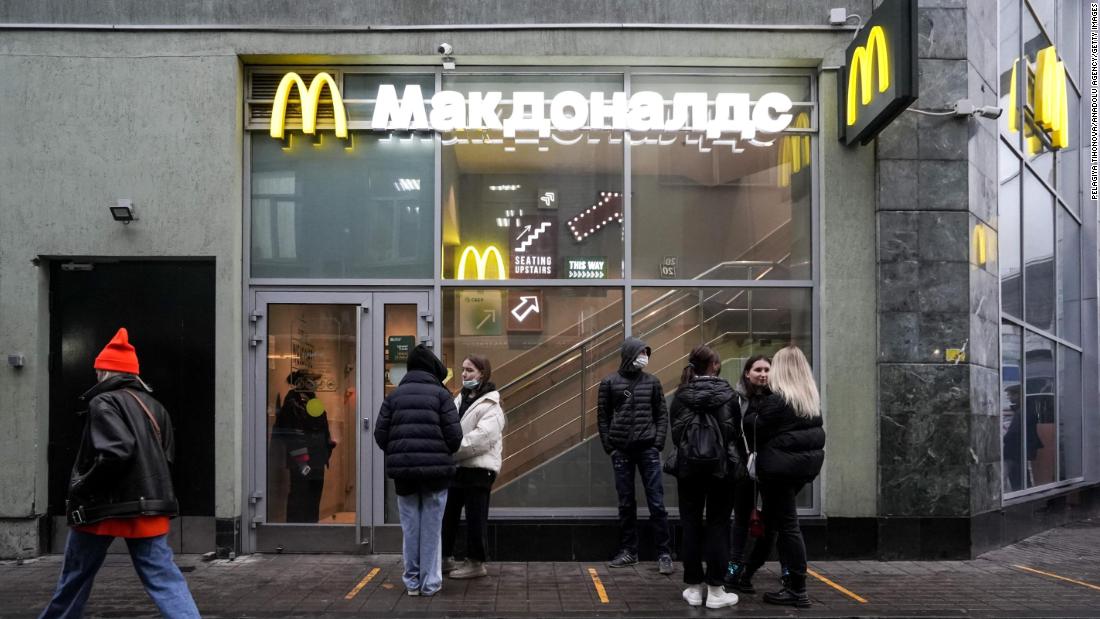McDonald’s and Starbucks have decided to close their restaurants and cafes in Russia, and Coca-Cola has said it will suspend operations there in response to the Russian invasion of Ukraine. PepsiCo will also withdraw some products from the country.
“McDonald’s has decided to temporarily close all of our restaurants in Russia and suspend all operations in the market,” CEO Chris Kempczinski said in a statement Tuesday.
At the end of last year, there were 847 McDonald’s outlets in Russia, according to an investor filing.
Globally, most McDonald’s locations are operated by franchisees. But that is not the case in Russia, where 84% of outlets are operated by the company, according to the document. Russia’s restaurants, along with 108 others in Ukraine, all operated by McDonald’s, accounted for 9% of the company’s revenue in 2021, according to the document.
“In Russia, we employ 62,000 people who have poured their heart and soul into our McDonald’s brand to serve their communities. We work with hundreds of local, Russian suppliers and partners who produce the foods for our menu and support our brand,” Kempczinski said. “And we serve the millions of Russian customers who count on McDonald’s every day. In the more than thirty years that McDonald’s has operated in Russia, we have become an essential part of the 850 communities in which we operate,”
However, he stated that the company’s values mean that they cannot “ignore the unnecessary human suffering unfolding in Ukraine”.
Starbucks
In a Tuesday message to employees, Starbucks CEO Kevin Johnson said that today they have decided to “suspend all business activity in Russia.”
He added: “Our licensed partner has agreed to immediately halt store operations and will provide support to the nearly 2,000 [empleados] in Russia who depend on Starbucks for their livelihood.
Johnson added that Starbucks decided to stop shipping all Starbucks products to Russia. “We condemn the horrific attacks in Ukraine by Russia and our hearts go out to all those affected,”
Do financial sanctions against Russia work?
Coca Cola
Coca-Cola also said Tuesday that it is “suspending its business in Russia.”
The company stated: “Our hearts go out to the people who are bearing the undue effects of these tragic events in Ukraine,” adding that it will monitor the situation.
PepsiCo, Danone and Unilever
This Tuesday, the CEO of PepsiCo, Ramon Laguarta, exposed the way in which PepsiCo is approaching the situation.
“Given the horrific events taking place in Ukraine, we are announcing the suspension of the sale of Pepsi-Cola, and our global beverage brands in Russia, including 7Up and Mirinda.” Laguarta added that Pepsi decided to suspend capital investments, advertisements and promotional activity in Russia.
However, PepsiCo will continue to sell some of its products, including formula, baby food, milk and other dairy options.
“We have a responsibility to continue offering our other products in Russia, including everyday essentials,” Laguarta said. “By continuing to operate, we will also continue to support the livelihoods of our 20,000 Russian associates and the 40,000 Russian farmworkers in our supply chain who face significant challenges and uncertainty in the future,”
Farryl Bertmann, a registered dietitian and senior lecturer in the Department of Nutrition and Food Sciences at the University of Vermont, warned that if the big food companies abandon Russia entirely, the population could be affected, even if they have other sources of food.
“I strongly believe that people should have the opportunity to buy a variety of foods at different prices,” he said. “That can only be done successfully if there is access.”
The expert said that “ultimately, food has to be available”, adding: “I would be very concerned if the food environment [cambiara] drastically.”
Other companies have taken an approach similar to Pepsi’s.
Danone, which makes Silk dairy alternatives, Activia, Oikos yogurt, baby formula and more, said in a LinkedIn post on Sunday that they have “decided to suspend all investment projects in Russia,” and would maintain the ” production and distribution of fresh dairy products and infant nutrition to continue to meet the essential food needs of the local population.
Unilever made a similar statement this week, saying it will continue to supply its “Russian-made essential food and hygiene products to the country’s population.”
The company said it has suspended imports of its products to Russia and will stop all investment in the country, as well as pausing exports from there. He said that he will not benefit from his presence in Russia.
Coping with pressure
The announcements came after pressure from critical voices calling for the companies to leave Russia. Several Western companies from multiple sectors have halted operations in Russia following the country’s attack on Ukraine, but some restaurants continue to sell their wares in the country.
In the case of some restaurant chains, this may be because the locations are operated by franchises, giving corporate owners less control.
Yum Brands, which owns KFC, Pizza Hut, Taco Bell and Habit Grill, said in a statement that it “has suspended all restaurant investment and development in Russia.”
The company added that it “will redirect all profits from operations in Russia to humanitarian efforts,” in addition to making donations to the Red Cross through the Yum Brands Foundation. Yum has about 1,000 KFC restaurants and 50 Pizza Hut locations in Russia. The company said most of them are operated by independent owners.
On Twitter, people used boycott hashtags to target companies like McDonald’s and PepsiCo, which until today had said nothing about their plans for Russia.
McDonald’s, PepsiCo and other companies were criticized by New York State Comptroller Thomas DiNapoli.
Before McDonald’s made its announcement, DiNapoli sent an email to several companies represented in the New York State Common Retirement Fund, including PepsiCo and McDonald’s, urging them to stop doing business with Russia.
“Companies like McDonald’s and PepsiCo, which have a large footprint in Russia, need to consider whether doing business in Russia is worth the risk during this extraordinarily volatile time,” DiNaPoli said in a statement.

